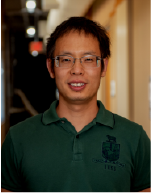
Events

Events
Title: Turbulent Boundary Layer Control and Drag Reduction Using Dynamic Free-slip Surfaces
Time: 13:30 to 15:30, Tuesday, November.21, 2023
Place: F210, School of Mechanical Engineering
Host: LIU Yingzheng, Professor (Institute of Turbomachinery)
Biography
Dr. Cong Wang is currently assistant professor in the Department of Mechanical Engineering at  the University of Iowa. His current research interest lies in the general area of turbulent flow, multi-phase flow, and the development of advanced flow diagnosis techniques. He is a recipient of the Ernest E. Sechler Memorial Award in Aeronautics in 2018 and the Donald Coles Prize in Aeronautics in 2019 from Caltech.
the University of Iowa. His current research interest lies in the general area of turbulent flow, multi-phase flow, and the development of advanced flow diagnosis techniques. He is a recipient of the Ernest E. Sechler Memorial Award in Aeronautics in 2018 and the Donald Coles Prize in Aeronautics in 2019 from Caltech.
Abstract
The wall-bounded turbulent flows over the surfaces of airplanes or oil tankers produce a tremendous amount of drag force, thereby substantially undermining the energy efficiency of transportation systems. Consequently, a basic understanding of and effective control over wall-bounded turbulent flow have been long-standing pursuits for both scientists and engineers. Although many promising drag reduction techniques have been developed (e.g., the super-hydrophobic surface method), sustainable drag reduction remains a fundamental challenge.
In this presentation, I will introduce a novel method that employs an array of wall-attached oscillating free-slip air-film surfaces, capable of achieving a substantial drag reduction effect (more than 40%). The physics of oscillating free-slip surfaces interacting with quiescent water, laminar boundary layers, and turbulent boundary layers will be discussed, revealing the mechanism of drag reduction. These oscillating free-slip surfaces generate long-lasting coherent streamwise vortices, lifting the high-shear motions away from the wall boundary. An energy exchange analysis demonstrates that the turbulent flow near the wall partially re-laminarizes through a reversed energy cascade process. These fundamental discoveries hold significant value for the development of an optimal drag reduction technique.


Shanghai Jiao Tong University
Address: 800 Dongchuan Road, Shanghai
200240